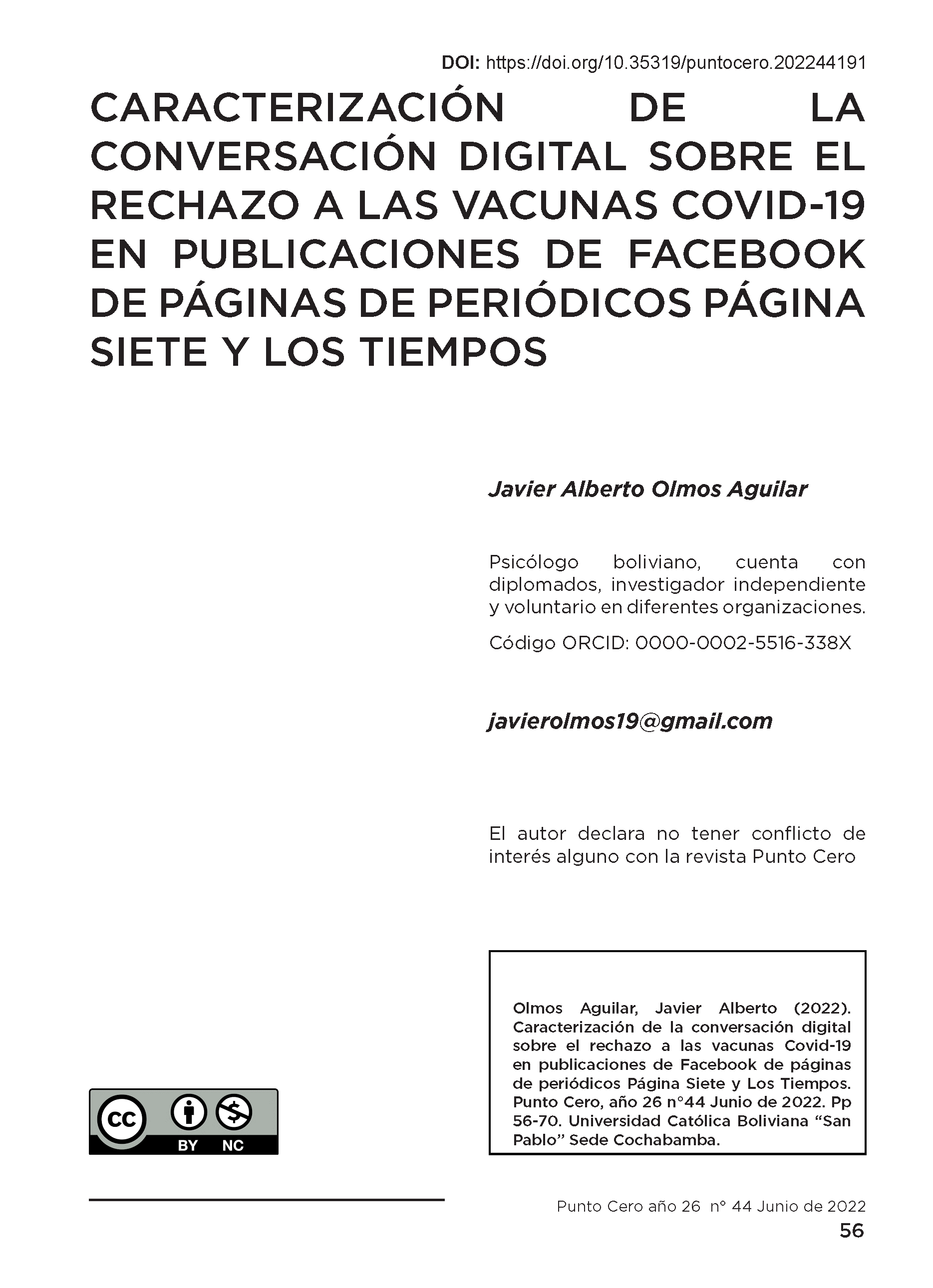Characterization of the digital conversation on the rejection of COVID-19 vaccines in Facebook posts from newspaper pages Página Siete and Los Tiempos
DOI:
https://doi.org/10.35319/puntocero.202244191Keywords:
Coronavirus, Social Networks, Vaccination, Newspaper, Facebook, Digital Conversation, BoliviaAbstract
The rejection of COVID-19 vaccines in Bolivia causes the vaccination campaign to progress slowly. This research was carried out aiming to characterize the digital conversation about the rejection of COVID-19 vaccines in the Facebook posts of the pages of the newspapers Página Siete and Los Tiempos, between March and July of 2021. The method used to addressing the problem was virtual ethnography. A digital observation guide was used to build a database with a total of 223 publications for further analysis. The results are organized according to the categories: digital conversation topics, evolution and virtual communities. Among the most relevant results, it is shown that the conversation about rejection varies according to the brands of the vaccines. The topic of the political link for or against authorities regarding the management of the vaccination process and vaccine brands is constant in most of the publications. This research is a point of reference to make visible the influence of social networks in the decision-making of the Bolivian population and a means that facilitates the adaptation of strategies to increase vaccination rates.
References
Agencia EFE. (17 de julio de 2021). La pandemia de los no vacunados y otras claves de la covid-19 en América. EFE. https://www.efe.com/efe/america/sociedad/la-pandemia-de-los-no-vacunados-y-otras-claves-covid-19-en-america/20000013-4588602
Baldwin, C. (15 de febrero de 2021). Cómo Utilizar Las Reacciones De Facebook En Sus Esfuerzos De Marketing. WSI. Recuperado el 2 de noviembre del 2021 de https://www.wsiworld.lat/blog/como-utilizar-las-reacciones-de-facebook-en-sus-esfuerzos-de-marketing
Boyd, D., y Ellison, N. (2007). Social network sites: Definition, history, and scholarship. Journal of computerἠmediated Communication, 13(1), 210-230. https://onlinelibrary.wiley.com/doi/full/10.1111/j.1083-6101.2007.00393.x DOI: https://doi.org/10.1111/j.1083-6101.2007.00393.x
Cabrera, U. (04 de marzo de 2021). Arranca vacunación contra Covid-19 para pacientes con enfermedad de base. Los Tiempos. https://www.lostiempos.com/actualidad/cochabamba/20210304/arranca-vacunacion-contra-covid-19-pacientes-enfermedad-base
Chen, R., Rastogi, S., Mullen, J., Hayes, S., Cochi, S., Donlon, J., y Wassilak, S. (1994). The vaccine adverse event reporting system (VAERS). Vaccine, 12(6), 542–550. https://doi.org/10.1016/0264-410X(94)90315-8 DOI: https://doi.org/10.1016/0264-410X(94)90315-8
Consuegra-Fernández, M. (2021). El movimiento antivacunas: un aliado de la COVID-19. Revista Internacional De Pensamiento Político, 15, 127–138. https://doi.org/10.46661/revintpensampolit.5598 DOI: https://doi.org/10.46661/revintpensampolit.5598
Cruz, M., Rodríguez, A, Hortal, J. y Padilla, J. (2019). Reticencia vacunal: análisis del discurso de madres y padres con rechazo total o parcial a las vacunas. Gaceta Sanitaria, 33(1), 53-59. https://www.gacetasanitaria.org/es-reticencia-vacunal-analisis-del-discurso-articulo-S0213911117301838
Cuesta-Cambra, U., Martínez-Martínez, L., y Niño-González, J.-I. (2019). An analysis of pro-vaccine and anti-vaccine information on social networks and the internet: Visual and emotional patterns. Profesional De La Información, 28(2). https://doi.org/10.3145/epi.2019.mar.17 DOI: https://doi.org/10.3145/epi.2019.mar.17
Dredze, M., Broniatowski, D. A., Smith, M. C., y Hilyard, K. M. (2016). Understanding Vaccine Refusal: Why We Need Social Media Now. American journal of preventive medicine, 50(4), 550– 552. https://www.ncbi.nlm.nih.gov/pmc/articles/PMC4801675/ DOI: https://doi.org/10.1016/j.amepre.2015.10.002
Flores Márquez, D. (2017). Internet más allá de internet: el estudio de la comunicación desde la etnografía digital.Virtualis,7(14),39-52.https://www.revistavirtualis.mx/index.php/virtualis/article/view/187
García, N. (2017). Hablemos de vacunas. Form Act Pediatr Aten Prim, 10(4), 151-3. https://fapap.es/articulo/448/hablemos-de-vacunas
González-Melado, F. J., y Di Pietro, M. L. (2020). The vaccine against COVID-19 and institutional trust. La vacuna frente a la COVID-19 y la confianza institucional.Enfermedadesinfecciosas y microbiologia clinica (English ed.), S0213-005X(20)30266-4. https://doi.org/10.1016/j.eimc.2020.08.001 DOI: https://doi.org/10.1016/j.eimc.2020.08.001
Hornsey,M.J.(2020).WhyFactsAreNot Enough: Understanding and Managing the Motivated Rejection of Science. Current Directions in Psychological Science, 29(6), 583–591. https://doi.org/10.1177/0963721420969364 DOI: https://doi.org/10.1177/0963721420969364
Hornsey, M.J., Edwards, M., Lobera, J., Díaz-Catalán, C. and Barlow, F.K. (2021), Resolving the small-pockets problem helps clarify the role of education and political ideology in shaping vaccine scepticism. British Journal of Psychology, 112(4), 992- 1011. https://doi.org/10.1111/bjop.12500 DOI: https://doi.org/10.1111/bjop.12500
Larrondo Ureta, A., Peña Fernández, S., y Morales i Gras, J. (2021). Desinformación, vacunas y Covid-19. Análisis de la infodemia y la conversación digital en Twitter. Revista Latina de Comunicación Social, 79, 1-18. https://www.doi.org/10.4185/RLCS-2021-1504
Latané, B., y Nida, S. (1981). Ten years of research on group size and helping. Psychological Bulletin, 89(2), 308– 324. https://doi.org/10.1037/0033-2909.89.2.308 DOI: https://doi.org/10.1037/0033-2909.89.2.308
Los Tiempos. (16 de febrero de 2021a). Primeros cien días de Arce en Bolivia, entre vacunación y polémicas políticas. Los Tiempos. https://www.lostiempos.com/actualidad/pais/20210216/primeros-cien-dias-arce-bolivia-vacunacion-polemicas-politicas
Los Tiempos. (12 de octubre de 2021b). Lucha contra Covid-19 se estanca, sólo se vacuna al 1% cada semana. Los Tiempos. https://www.lostiempos.com/actualidad/cochabamba/20211012/lucha-contra-covid-19-se-estanca-solo-se-vacuna-al-1-cada-semana
Página Siete (02 de abril de 2021). Salud justifica inmunización lenta por retraso de vacunas. Página Siete. https://www.paginasiete.bo/sociedad/2021/4/2/salud-justifica-inmunizacion-lenta-por-retraso-de-vacunas-289473.html
Pérez-Dasilva, J., Meso-Ayerdi, K., y Mendiguren-Galdospín, T. (2020). Fake news y coronavirus: detección de los principales actores y tendencias a través del análisis de las conversaciones en Twitter. Profesional de la Información, 29(3). https://doi.org/10.3145/epi.2020.may.08 DOI: https://doi.org/10.3145/epi.2020.may.08
Pink, S. y Postil, J. (2012). Social media ethnography: The digital researcher in a messy web. Media International Australia, 1(45), 123-134. https://www.academia.edu/2046692/Social_media_ethnography_the_digital_researcher_in_a_messy_web?from=cover_page DOI: https://doi.org/10.1177/1329878X1214500114
Thelwall, M., Kousha, K. y Thelwall, S. (2021). “Covid-19 vaccine hesitancy on English-language Twitter”. Profesional de la información, 30(2), 1-13. https://doi.org/10.3145/epi.2021.mar.12 DOI: https://doi.org/10.3145/epi.2021.mar.12
Wallace, A. (11 de enero de 2021). Vacunas contra el coronavirus: “Para que todos estemos protegidos la vacunación realmente tiene que ser global”. BBC News Mundo. https://www.bbc.com/mundo/noticias-55612239

Downloads
Published
How to Cite
Issue
Section
License
Copyright (c) 2022 Revista Punto Cero

This work is licensed under a Creative Commons Attribution-NonCommercial 4.0 International License.








